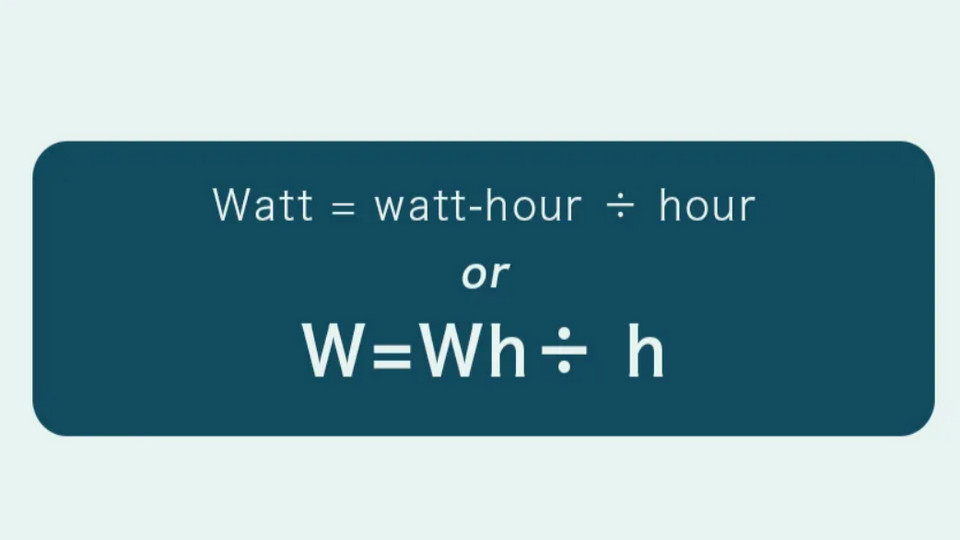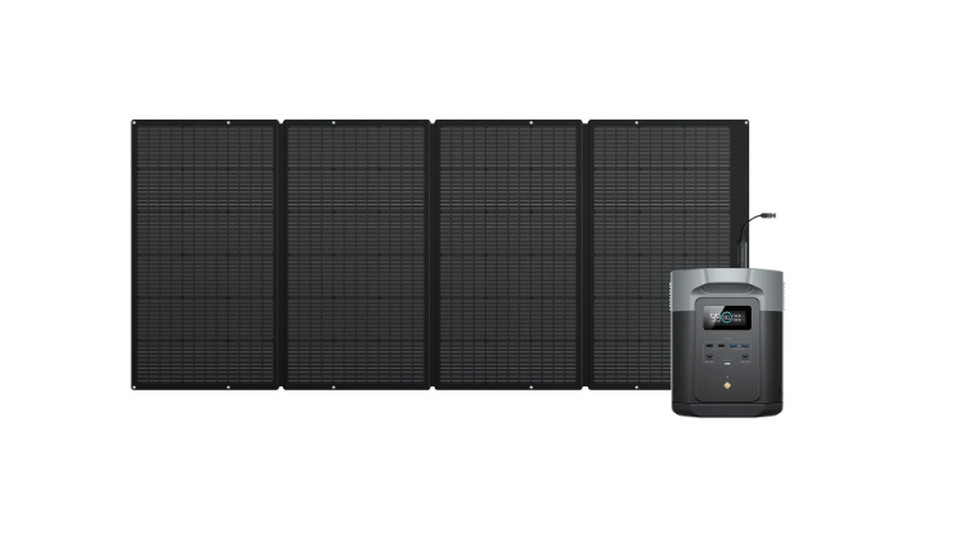What Is a Watt Hour and Why Does It Matter?
When buying appliances or portable power stations, you'll often come across the unit watt-hours. A similar term, kilowatt-hours, is commonly seen on electricity bills. But what is a watt-hour, and what does this unit mean?
Understanding the watt-hour meaning can help you make smarter energy decisions at home. It allows you to spot which appliances are consuming the most electricity and driving up your bills. In this guide, we’ll break down the meaning of a watt-hour, show you how to use it in everyday calculations, and explain how it can affect your overall energy consumption. Keep reading!
What Do Watt Hours Mean?
A watt-hour (Wh) is a unit of energy that measures how much electricity a device uses or produces over a period of time. Although it’s not an official SI (International System of Units) measurement, watt-hours are commonly used in electrical and energy-related fields. It combines two basic concepts: watts, which measure the rate of energy use or production, and hours, which represent the amount of time that rate is sustained.
The formula for calculating watt-hours is:
Wh = Watt(W) × time (h)
For example, imagine you’re using an electric heater with a power rating of 200 watts. If you leave it on for three hours, the energy consumption would be:
200W × 3h = 600 Wh
That means your electric heater consumed 600Wh of electricity during those three hours.
Knowing the Wh can help you estimate how much energy different appliances use and spot which ones might be driving up your electricity bill.
Note: On your electricity bill, you’ll usually see energy usage listed in kilowatt-hours (kWh), where 1 kWh = 1000 Wh.
Watt vs Watt-Hour: What’s the Difference?
Now that you know what a watt-hour (Wh) is, let’s clear up another common question: how is it different from a watt (W)?
While a watt-hour measures the total amount of energy used over time, a watt measures the rate of energy use at a specific moment. In simple terms, watts tell you how much power something needs to run right now, while watt-hours tell you how much energy it uses over a period of time.
Here’s an easy way to think about it:
Think of a car cruising at 50 kilometers per hour. That speed is like the wattage, telling you how quickly energy is being used at that moment. If the car keeps moving for one hour, it will have traveled 50 kilometers. In the same way, watt-hours show how much energy is used when a device runs at a certain power level over time.
Now, back to an everyday example: a computer.
Watts measure how much electricity is needed to keep the computer running at any given moment. Watt-hours measure how much electricity the computer consumes if you use it for one hour.


Common Examples of Watt-Hour Usage
Watt-hours might sound a bit technical at first, but they’re actually part of your everyday life more than you realize.
For starters, you can use watt-hours to figure out how much energy your appliances use over time. Most appliances list their power in watts. To work out how much energy they've used, you simply multiply the watt rating by the number of hours you've used them. It helps you to find out which appliances are energy-hungry and decide if it’s time to swap them out for more efficient ones.
Watt-hours also come into play when you're looking at battery capacity, portable power stations, and even how many times you can recharge your devices. If you’re shopping for a generator, knowing how many watt-hours you need helps you pick the right size based on what you want to power and for how long.
Take the EcoFlow DELTA 2 Max, for example. It’s one of the top solar generators available today, offering a strong 2048Wh base capacity. To put that into perspective, it can run a refrigerator for about 14 hours, keep a TV going for 15 hours, power a washing machine for around 3.3 hours, and even keep your Wi-Fi router running for an incredible 97 hours.
With a high-capacity power station like the DELTA 2 Max, you can keep your lights on and your internet running smoothly, even during unexpected power outages. It’s like having a safety net for your home’s energy needs.


How Watt Hours Apply to Your Electricity Bill?
Watt-hours tell you how much electricity you’re using, and that’s exactly what shows up on your electricity bill.
But because homes and businesses use a lot of energy, measuring everything in watt-hours would be a bit messy. That’s why we use kilowatt-hours (kWh) instead. It’s just a bigger unit, and it’s easy to switch between the two:
1 kWh = 1,000 Wh
In the UK, the average cost of electricity is about £0.274 per kWh. To figure out how much something costs to run, simply multiply the number of kilowatt-hours by the price.
Let’s say you have an appliance that uses 1,000 watt-hours, or 1 kWh. At £0.274 per kWh, running that appliance would cost:
1 kWh × £0.274 = £0.274
Once you understand this simple math, reading your electricity bill and spotting ways to save becomes a lot easier.
Conclusion
Understanding what is a watt-hour helps you take control of your energy use, from managing electricity costs to choosing the right appliances and backup solutions. By knowing how watt-hours work, you can easily spot where energy is being used and find smarter ways to save. EcoFlow portable power stations, designed with watt-hour capacity in mind, make it easy to plan your energy needs and stay powered up, whether at home or on the move.
FAQs
What does 1 watt-hour mean?
It represents the energy consumed in one hour using a 1W power appliance. Note that Wh is a measurement unit, not a power unit.
Is 200W the same as 200Wh?
No, 200W and 200Wh are not the same. 200W (watts) measures the rate of power a device uses at a given moment, while 200Wh (watt-hours) measures the total amount of energy used over time. For example, a 200W device running for one hour would consume 200Wh of energy.
What does 500 watt-hours mean?
Five hundred watt-hours means a device has used or stored 500 watts of power over one hour. It shows the total amount of energy consumed or available. For example, if you run a 100-watt appliance for five hours, it will use 500 watt-hours of electricity in total.
How long does 1 watt-hour last?
How long 1 watt-hour lasts depends on how much power the device uses. If a device uses 1 watt of power, 1 watt-hour will last for one hour. If the device uses more, it will drain faster. Higher-powered devices consume watt-hours more quickly than smaller, low-powered ones.